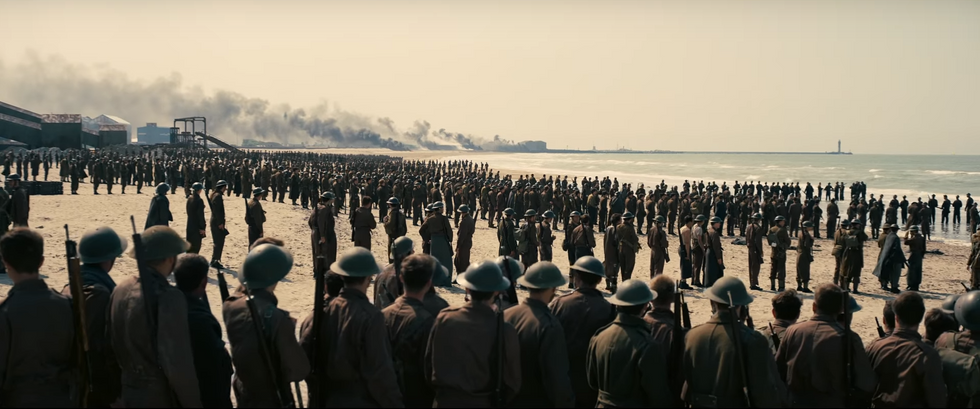Every year at the Academy Awards, there is always a film nominated for Best Picture that is known as the “honorable mention”. The honorable mention is a film that pleases crowds intensely, contains wonderful artful film technique, and ultimately, has no chance of actually winning Best Picture. Last year, the honorable mention was Arrival, an Amy Adams film about alien communication. The year before that, the honorable mention was The Martian, a story following Matt Damon as he tries to survive on Mars alone. This year, the honorable mention is Dunkirk.
Following the story of the famously surrounded British soldiers, Dunkirk follows the story of the heart-wrenching event during World War II that left the Allied soldiers completely surrounded by Nazi forces. Instead of allowing the navy to take their boat, Mr. Dawson and his son Peter, accompanied by Peter’s friend George, take their boat out to see in order to save some of the endangered soldiers. The story is told from three perspectives: land, water, and air; bringing numerous helpful views to the situation, and allowing an audience to truly grasp each level of the war battle.
The film, directed by Christopher Nolan, contained very little dialogue in order to truly capture the emotion and fear that came from the situation. A creative choice by Nolan, having scarce dialogue to support the plot made the events of the movie truly realistic, and allowed for each conversed moment to have a clear and definite purpose. Along with a streak of little dialogue, the music in the film served to be only essential in certain moments. Starting off at the beginning with uneasy, minimal ticks, the score of Dunkirk crafted suspense with a slow crescendo of music from the beginning and all the way to the end. Though the score was used effectively and more often as the film drew on, moments that were absent of music helped the film to capture it’s truly realistic background.
Visually, Dunkirk followed a trend of extremely balanced, and carefully executed shots in the beginning. As the movie progressed, composition became less organized, less balanced, and more chaotic; a perfect equilibrium to the unexpected, suspenseful events of the story itself. A handheld, balanced style was very frequent during events on land and sea, while smooth and unbalanced shots took to the air force portion of the story. To support the historical events, the picture and style held a somber realism that kept a viewer wrapped in the events of the story. Christopher Nolan’s visual style definitely shines through in this film, and unlike so many other war movies made in Hollywood, the visuals were easy to follow, and always necessary.
Performances in Dunkirk were certainly impressive, and the acting certainly captured the numb yet achingly terrifying emotions that the soldiers and civilians had experienced during the historical event. Harry Styles, singer and former member of famous British pop-band One Direction, makes his film debut in Dunkirk as Alex, a British soldier. Though his performance is not the most notable in the movie, many audience members were shocked by his incredibly realistic performance, especially coming from a regular pop-singer styled life. Overall, Dunkirk’s performances shined, but not enough to escape the shadow of the visual and artistic beauty of the film.
As for the general public’s opinion, students saw the movie in two different lights. Mike Ekelburg, a sound design major at Pace University, expressed his immediate dislike for the film, stating, “It was anticlimactic, a bunch of events happening that didn’t really lead up to a climax.” Though Ekelburg was disappointed with the plot, he concluded on a compliment: “The score was amazing. Hans Zimmer’s use of the shepard's tone and the ticking clock was phenomenal.” That being said, the plot might have not made its way to the hearts of some viewers, but an element of the movie certainly did. On the other hand, Dunkirk enthusiast Taylor Fagliarone, a sophomore at Pace University, held an intense passion for the film. “This story hasn’t been told enough,” She began, “and the way Nolan interpreted it was intriguing.” Fagliarone and Ekelburg’s differing views on the plot are certainly both supportable, proving Dunkirk is a piece that strikes a different chord in each viewer.
Overall, Dunkirk swept a feeling of community and heartache into the souls of so many viewers across the globe. Nolan’s adaption of the historical event was one of absolute credibility, however, the film has no realistic chance of winning best picture at the Oscars this year. Though it will not win this award, it had certainly deserved the nomination, between the intrinsic composition style, and the incredible dialogue-minimal script.























